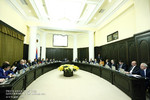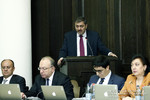Thursday, 10 April 2014
Education, healthcare, revenue collection and Police will be priority spheres in the Government’s new anti-corruption program
Today’s Cabinet sitting approved the concept of combating corruption in public administration. The concept is the instrument to ensure the continuity of the Government’s policy against corruption. The draft concept was prepared by a working group formed within the framework of the Commission on the monitoring of the implementation of the anti-corruption strategy. The working group featured representatives of the Government, other public bodies, experts, and representatives from Transparency International anti-corruption center. The draft concept was also discussed in the Office of Government.
The concept seeks to improve the existing institutional system of combating corruption in accordance with international criteria. Under the legal acts adopted on the basis of the concept, it is planned to review the principles of formation, functions and procedures of the Anticorruption Council, as well as to set up a standing and independent expert Commission to ensure effective implementation of Anticorruption Council’s functions.
The concept aims to enhance public confidence in the system of public administration, form a fair and responsible public service, as well as to achieve transparency and accountability in public administration. The concept will be implemented on the basis of the timetable established under the Government anti-corruption strategy and relevant programs.
According to the Government’s Decree, by July 15, 2014, a draft an anticorruption strategy as developed with the participation of civil society will be submitted for consideration by the council on the fight against corruption. Education, healthcare, revenue collection and Police will be priority spheres in the Government’s new anti-corruption program.
During the development of the concept, expert advice was provided by a number of international organizations, including in particular, the EU delegation to Armenia, the United Nations Development Program and the U.S. Agency for International Development.
During working meetings held with the experts of these organizations, the following issues were discussed, in particular: the goals, objectives, concepts of the anticorruption policy, the prerequisites for formation of an effective institutional system, as well as the criteria for selecting target areas to implement anticorruption programs.









